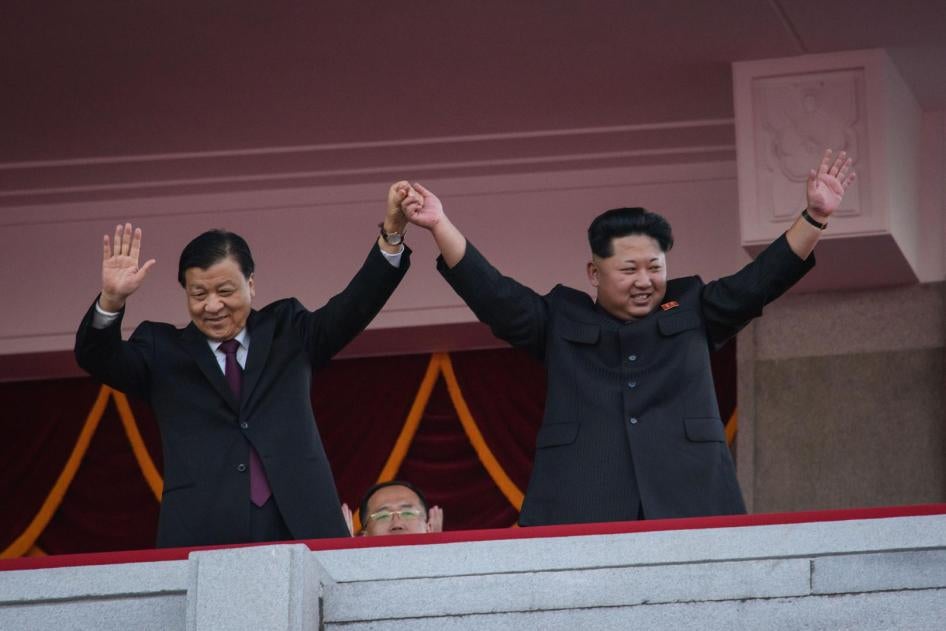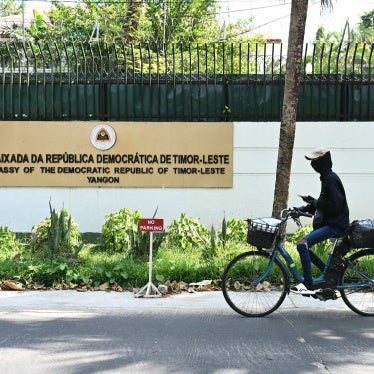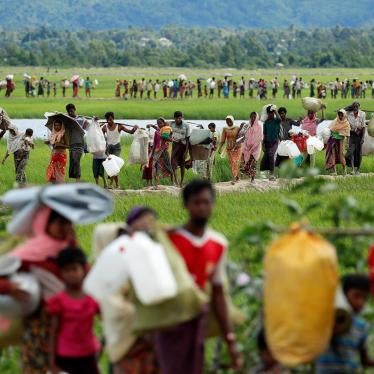(Seoul) – China should immediately release five North Korean refugees held in Chinese detention and agree not to return them to North Korea, where they would face grave danger, Human Rights Watch said today. China should protect the five refugees and let them travel to safety in a third country, Human Rights Watch said in a letter to Chinese President Xi Jinping.
North Koreans who are forcibly repatriated after fleeing their country face a real risk of torture, sexual violence and abuse, incarceration in forced labor camps, and public executions, making them refugees in need of urgent protection under international law.
“China should not force these five refugees back to North Korea, where the government is known to severely violate the rights of those sent back using methods such as torture, sexual violence, forced labor, and long-term incarceration in North Korea’s brutal prison camp system,” said Phil Robertson, deputy Asia director at Human Rights Watch. “Beijing should fulfill its obligations under the UN Refugee Convention by releasing these five refugees and permitting them to go to a third country where they can be safely protected.”
Late last week, Chinese government officials detained the group traveling to the city of Shenyang, Liaoning province, in northeastern China. Three of the five refugees are relatives of “Lim,” a North Korean now living in South Korea and using a pseudonym. On June 16, Lim received a call from her brother, who was using a smuggled Chinese phone in North Korea. He told Lim that he had crossed the Yalu river, on the border between North Korea and China, with their mother and a cousin. He had been carrying their mother, who was too weak to walk, and needed help because the group had gotten lost on the mountain. Lim’s relatives had no food and her brother eventually lost consciousness from exhaustion and hunger.
Lim was eventually able to contact someone who could help guide the group and provide them with food and basic assistance. Lim told Human Rights Watch that she spoke to her family a few days later, when the person trying to help them reached the group before departing by car. She has not been able to contact them since then.
On June 21, Lim learned from her local contacts that the group, including her three relatives, was detained by the Chinese military near Yanji city, Jilin Province. On June 22, she heard that authorities were about to move her family to Helong, 70 kilometers southwest of Yanji.
China regularly labels North Koreans as illegal "economic migrants" and forcibly repatriates them to North Korea based on a 1986 bilateral border protocol. However, regardless of why North Koreans decide to flee the country, they are virtually guaranteed to face extremely abusive treatment if forced to return. For this reason, international law considers them all to be refugees sur place, or refugees because of circumstances after their departure.
China, as a state party to the 1951 UN Convention on Refugees and its 1967 Protocol, as well as the 1984 Convention against Torture, is specifically obligated not to return refugees when that may put them at risk of persecution or torture. The same obligations bind China as a matter of customary international law. Forcing North Koreans back to North Korea amounts to refoulement, or the sending of persons back to territory where they face serious human rights violations. Such a practice forbidden by international treaties to which China is a party.
According to interviews conducted by Human Rights Watch with North Koreans who have previously been apprehended in China and returned to North Korea, the North Korean government harshly punishes all those who leave the country without permission.
In 2010, North Korea’s Ministry of People’s Security adopted a decree making defection a crime of “treachery against the nation,” punishable by death. North Koreans who have fled the country since 2013, or who maintain contacts inside the country, have told Human Rights Watch that people repatriated by China face severe penalties. Those caught while trying to go to South Korea can face 7 to 15 years of forced labor in ordinary prison camps (kyohwaso – re-education correctional facilities), incarceration in political prison camps (kwanliso), or even execution.
North Koreans may be sentenced to more than two years of forced labor in ordinary prison camps for living illegally in China. A former senior official in the North Korean state security service (bowibu) who worked on the border and received North Koreans sent back from China, told Human Rights Watch that officials torture every returnee to find out where they went in China, who they contacted, and what they had done.
Lim remains especially concerned about her family’s treatment because police detained and forcibly disappeared her father in 2010. When detainees vanish without information on whereabouts, trial dates or result, the community assumes the person has been sent to political prison camps (kwanliso). Lim fears that because of their father’s status, her family will be lost in the kwanliso system.
Political prison camps in North Korea are characterized by systematic abuses and often deadly conditions, including meager rations that lead to near starvation, virtually no medical care, lack of proper housing and clothes, regular mistreatment that includes sexual assault and torture by guards, and summary executions. Death rates in these camps are reported by former North Korean prisoners and guards to be extremely high. Detainees in ordinary prison camps also face forced labor, food and medicine shortages, and regular mistreatment by guards.
The 2014 UN Commission of Inquiry on Human Rights in North Korea found that those fleeing the country are targeted as part of a “systematic and widespread attack against populations considered to pose a threat to the political system and leadership of the DPRK… to isolate the population from contact with the outside world.” It also found that crimes against humanity, including torture, execution, enslavement, and sexual violence, are committed against prisoners and people forcibly returned to North Korea from China.
Human Rights Watch calls on China to stop repatriating North Koreans, and to allow the UN refugee agency to exercise its mandate and protect people. China should provide asylum to North Korean refugees, let them seek resettlement in a third country, or allow them to pass through Chinese territory without fear of arrest or forced returns.
In December 2016, the UN Security Council again discussed for a third year in a row the human rights situation in North Korea as a threat to international peace and security. In March, the UN Human Rights Council passed a resolution that strengthens the UN’s work to assess and develop strategies to prosecute pervasive human rights crimes by the North Korean government.
“There is no way to sugarcoat this: if these people are forced back to North Korea, their lives and safety will be at risk,” said Robertson. “The world is watching to see whether Beijing fulfills its duty to protect these five refugees or again becomes complicit with North Korea’s abuses.”









